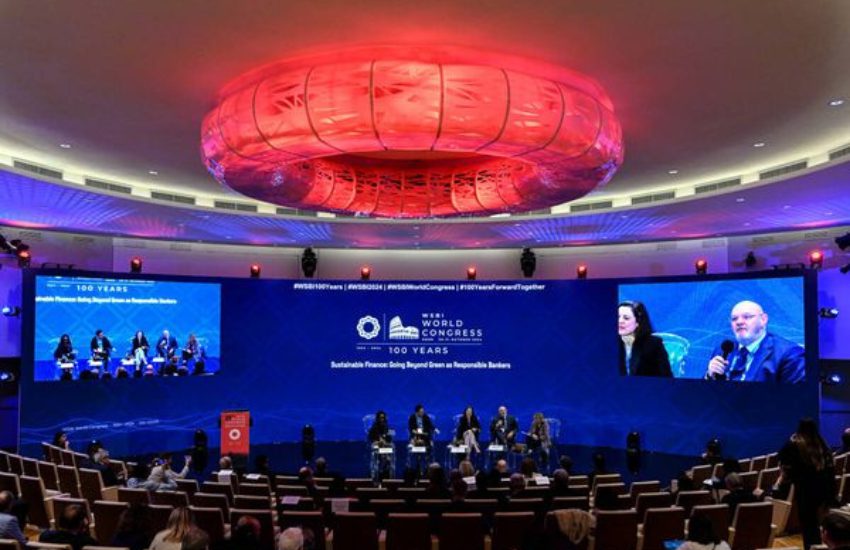The World Savings and Retail Banking Institute brings together more than 6,400 entities from 78 countries. It has created the Social and Philanthropic Council, a body to channel investments in social programmes
The World Savings and Retail Banking Institute (WSBI) recently held its 27th World Congress in Rome to mark its 100th anniversary. It is the oldest banking association in the world, which brings together more than 6,400 entities from 78 countries. Founded in Milan on 31 October 1924 with the goal of promoting savings to ensure financial security and independence, a century later, in addition to dealing with regulatory issues, it is focused on building a more inclusive and sustainable society through innovation, philanthropy and open dialogue.
To this end, its member entities, such as the German Sparkassenstiftung, the State Bank of India, Colombia's Fundación Grupo Social, and the CECA sector in Spain, each year allocate $3.5 billion to social action initiatives around the world. The programmes they invest in are aligned with the United Nations Sustainable Development Goals (SDGs), and range from rebuilding communities after natural disasters to financing medical equipment in underdeveloped countries, promoting initiatives for financial inclusion and empowering women-led SMEs, among many others.
And precisely in order to continue extending Obra Social globally, the international organisation has created the Social and Philanthropic Council, a new body which centralises all the activities undertaken, as well as giving visibility to all the projects and encouraging the exchange of ideas and knowledge among members.
During the first meeting of the Council, which took place in Thailand last April, the member entities signed the Bangkok Declaration, a manifesto in which they undertake the commitment to implement actions in six areas: youth population, poverty reduction, support for education, women's empowerment, the elderly and sustainability of the planet.
Isidro Fainé, President of the WSBI, states that 'The establishment of the Social and Philanthropic Council underlines our ongoing commitment to bring about positive change in the world around us. The investments undertaken each year are not just numbers, but rather they represent tangible actions that reinforce communities, empower individuals, and drive meaningful progress around the world'.
The WSBI has 1.7 billion customers, $11.4 trillion in deposits, $3.5 billion in philanthropic investments, 220,000 branches and 2.1 million employees. 'Feeling and acting socially responsible is inextricably linked to our identity. We were born that way, it is part of our DNA, and it is our vocation. All of this translates into our way of banking, which is fundamentally different from other stakeholders in the sector and is also profitable, efficient and fair', noted Isidro Fainé.
851 millions to Obra Social in Spain
In Spain, the driving force behind Obra Social is CECA (association that represents CaixaBank, Kutxabank and Cajasur Banco, ABANCA, Unicaja, Ibercaja Banco, Caixa Ontinyent, Colonya Pollença and Cecabank, and more than thirty foundations). Education and research, culture, local development, job creation, sport, leisure, environment... The associated foundations and savings banks allocated a total of €851 million in 2023, an increase of 6.4% over the previous financial year. Thanks to this endowment, more than 80,960 activities have been conducted, with more than 30 million beneficiaries, with special focus on the most vulnerable groups.
In this regard, the approval of Spanish Law 26/2013 on Savings Banks and Banking Foundations marked a turning point, according to Alberto Aza, spokesperson for CECA: 'We are experiencing a radical transformation, giving rise to larger and more solvent groups, and preserving the sector's hallmark, Obra Social, which is implemented by the foundations'. Since then, the Obra Social of the CECA sector has invested more than €7.8 billion and implemented more than 930,000 activities. At the end of 2023, there was a 19.9% increase in investment compared to 2014.
Isidro Fainé, who, in addition to being the President of the WSBI, is Chairman of CECA and of Fundación “la Caixa”, reiterates that 'our purpose remains unchanged: to contribute to social advancement by funding projects that create opportunities for people to progress, striving to do all we can to promote financial inclusion, as a precursor to social inclusion, and with a special sensitivity towards the most vulnerable groups'.












